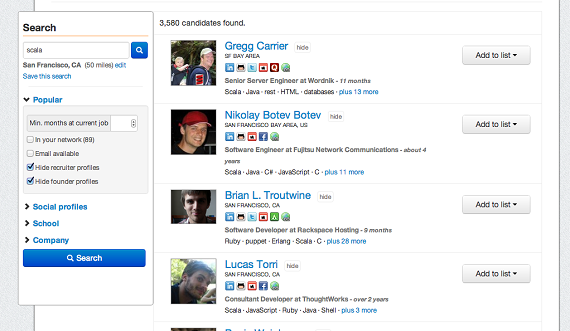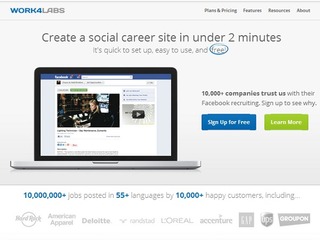
In this tough jobs market, it can be incredibly frustrating to send out resume after resume after resume, never even hearing back from most of the places you have applied. So what if employers could find you, with you even having to do anything?
Entelo, a search engine for employers to find suitable recruits to fill positions in their companies, has come out of stealth mode, it was announced Wednesday.
The company offers two products, Entelo Sonar and Entelo Search.
Sonar identifies candidates who are likely to be looking for a new job. Entelo determines this based on over 70 different variables, including if the person has recently updated their social profiles, moves within the company they are working for and earnings announcements.
In an interview with VatorNews, Entelo co-founder Jon Bischke said that one of these factors would not be enough to identify possible candidates, but when put together the company algorithm is able to determine if someone is looking for a new job. Entelo send email alerts to its customers if it finds relevant candidates who fit the open position that has been posted.
Search contains a database of over 300 million profiles, with information aggregated from social and professional communities such as GitHub, Stack Overflow, Twitter, Quora, Dribbble, GrabCad and other websites. Bischke says that Search operate in a similar manner to Google and other search engines: it pulls data that is already public to create a profile.

Bischke says Search is the “pull”, while Sonar is the “push.”
When a candidate and a job line up, the person will be contacted through their e-mail, if it has been made public, or will be contact over a social network, such as LinkedIn or Facebook.
When asked how the company deals with concerns over privacy, and over making profiles for people who possibly do not feel comfortable with that, he said that people can opt out by simply sending an e-mail. If someone is looking for a job, though, and does not want to make that information public, they can also opt in.
Entelo has raised an undisclosed amount of money from Battery Ventures and Menlo Ventures. The money will be used to expand the company’s database, and to grow its small 10 person team by hiring engineers, marketers and a sales team.
San Francisco-based Entelo was founded in May 2011 by Bischke and John McGrath, and got its first customer in April 2012. The company has been in stealth mode since.
Despite not having a sales team, Bischke said, Bischke Entelo was still able to sign up 40 customers, including Box, Lookout, LevelUp, Kontagent and Indiegogo. Most of its customers are smaller and fast growing. The company would like to eventually recruit jobs for larger companies, including those on the Fortune 500.
The idea for the company came from Bischke and McGrath’s days as entrepreneurs. Over 95% of companies would say they had trouble finding talent, so the founders saw an opportunity to bridge the gap between those seeking work and professional communities such as GitHub that were taking off at the time.
Right now, marketers simply match keywords to resumes, a process that is inefficient and does not get down to what makes a person right for a job. The old guard recruiters, such as Monster and CareerBuilder, are simply resume recruiters.
What Entelo does not have is a database full of resumes. What it does instead, he says, is provide more intelligence for recruiters, and help them find the right people by determining their personality and skills.
“We hope that a product like ours can make the recruiting more humanizing,” Bischke said.
At the moment, Entelo focuses solely on jobs for the tech sector, such as engineers, designers and scientists, though it does plan to expand to other markets later this year.
Entelo makes its money off monthly and annual subscriptions. Recruiters can either pay $500 a month, or $5000 annually, for one open job slot at a time. Once that slot is filled, the company can fill it with a new job, or even switch it over to a new job type. If a company wants an extra job slot, it costs them $300.
Bischke says that while the company will probably never try to make revenue off advertising, he does see a future for monetizing the data it has collected with its algorithm.
The recruiting tools market
Entelo is entering a market that is growing fast, with numerous other companies occupying the same space, and raising money.
BranchOut, a free service that allowed Facebook users to create a professional account that pulled work-relevant information from their profile and allowed them to search for available jobs or company connections, debuted a new tool last year called RecruiterConnect. It was designed to help companies and other professionals search, through BranchOut’s connection to Facebook, to find viable candidates.
There is also Zao, an Israeli-based start-up which helps employers manage referral programs and hire quality staff. The company announced in June that it raised $1.3 million in funding from Oren Zeev, founding partner at Orens Capital and former General Partner at Apax Partners.
Then there is TalentBin, which started off as Honestly.com, which was launched a couple years ago with $1.2 million in funding back in May 2010 from First Round Capital and Charles River Ventures. In July 2011 it became TalentBin, while it still had more than $600,000 in the bank.
TalentBin searches websites such as Twitter, Quora, GitHub to find implicit activities of engineers and other technical workers. By doing so, TalentBin can aggregate a fuller picture of a person that is not reflected in, say, a LinkedIn profile. The company moved out of private beta in May.
Last month, social recruitment company Work4 Labs debuted an expanded suite of products for companies to recruit workers off of Facebook. In addition, it also announced that it raised $11 million in Series A funding.
The company uses social networks, such as Facebook and Twitter, to help businesses recruit people to come work for them. The app gets permission to scan a users Facebook profile for education and work history. It then matches job openings from its clients to any openings that user may be qualified for.


















